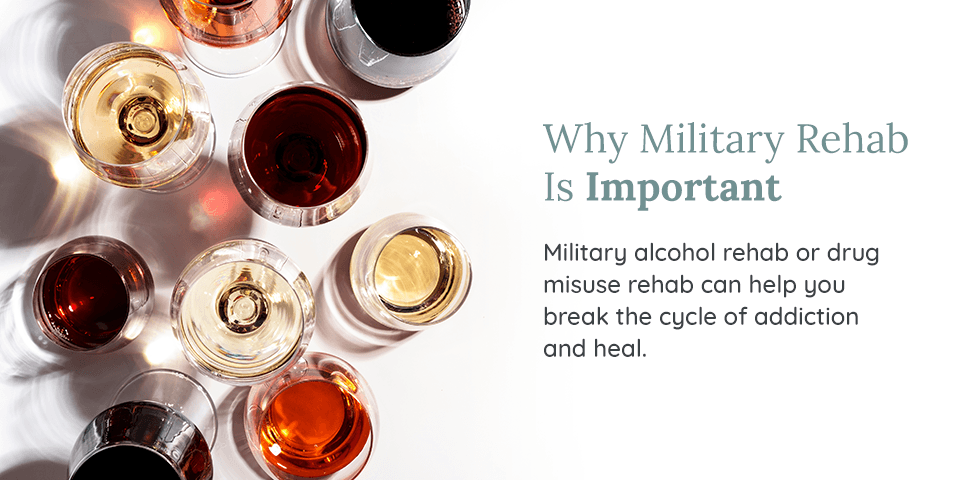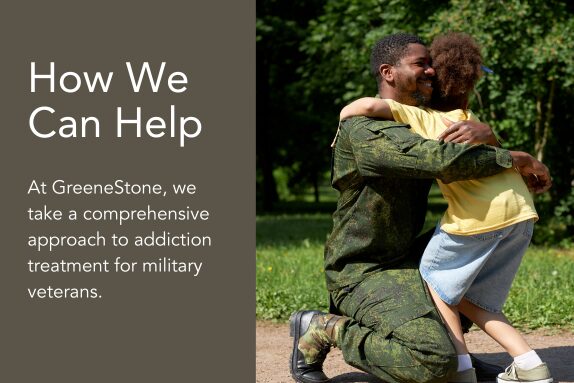Addiction Treatment for Military Veterans

For military veterans, navigating substance use issues can be particularly challenging. At GreeneStone, we understand the unique circumstances and barriers they face, and welcome them to reach out to our compassionate and supportive team with any questions about treatment. As part of our inpatient treatment program, we offer tailored support that addresses the unique needs of military veterans.
Call 1-855-821-5010 to Get Help Now
Barriers to Treatment for Military Personnel
Substance misuse is highly discouraged in the military. Active-duty service members can face a dishonourable discharge or even prosecution if they are discovered to be using illicit drugs. But, military service is associated with certain risk factors for developing a substance use disorder. For example, post-traumatic stress disorder (PTSD) and substance misuse are often related. Approximately 60% to 80% of CAF veterans who struggle with PTSD also develop substance use issues.
Random drug testing may deter the use of illicit substances, but active-duty members of the military may participate in binge drinking or cigarette smoking. Binge drinking is also a common issue for veterans with PTSD.
While the risk of substance use exists for both active members of the military and veterans, the stigma of treatment lingers. People may not seek help for fear of what it could do to their careers or the belief that they should manage their problems on their own. Starting a conversation about addiction among military members can address that stigma and encourage people to seek the help they need.
Getting Rid of Shame and Stigma
Members of the Canadian Armed Forces and Canadian military veterans are trained to defend our country. They face high expectations. They are called upon to have courage in the extraordinary circumstances of combat and active duty. While their service is honoured by many, it can be difficult for civilians to truly understand the high toll it can take on mental and physical health.
Military service is often associated with heroism and stoicism, but that does not change the fact that many active-duty members and veterans experience serious trauma that can lead to PTSD and addiction. Thousands of military members struggle with their mental health, but many of them do not seek help. There is a persistent fear that seeking help will result in career damage. The Canadian Armed Forces has a zero-tolerance policy for drug use, which complicates matters if an active member is struggling with substance misuse.
Addressing that stigma is not a simple matter. It demands serious cultural change within the military — change that addresses how mental health and mental illnesses are viewed at the institutional and individual levels. While change takes time, it can start small. Speaking about mental health is already becoming less of a taboo topic. Change can start with military veterans recognizing when they need help and asking for it.
Addiction in Military Veterans
Addiction can take many forms. Many people associate addiction with illegal drugs, like cocaine or heroin. However, people can also develop addictions to legal prescription drugs and alcohol. Many service members report binge drinking. According to one study, about one in six soldiers in Canada’s Armed Forces were affected by symptoms of alcohol-related or mental health issues.
One risk factor for addiction among military members and veterans includes:
- Trauma: Military members may turn to addictive substances to cope with issues like PTSD. PTSD is caused by traumatic experiences such as combat. It can cause intense flashbacks, nightmares, angry outbursts and anxiety. Without proper treatment, these symptoms can be incredibly disruptive to daily life. Drinking or using drugs may dull the symptoms, but this will not address the underlying cause or help you find a long-lasting solution.
Some military members and veterans may also struggle with other untreated mental health conditions. Anxiety and depression are common mental health conditions that affect many people, both in the military and in civilian life. Some other contributing factors for substance use disorder are:
- Physical pain: Veterans may use alcohol or drugs to manage chronic pain related to physical injuries sustained in the line of duty. Lost limbs, shrapnel wounds and head trauma are common injuries associated with active combat. Even military members who do not see combat can experience injuries related to the physical nature of their duties.
- Environment: The environment you grow up in and live in as both a child and an adult can influence your risk for addiction. If you are in a place where binge drinking or drug use is normalized, you may experience peer pressure to partake in the same behaviour.
Call 1-855-821-5010 to Get Help Now

Why Military Rehab Is Important
Addiction rehab for veterans is essential for improving mental health. Continuing to ignore the prevalence of addiction issues among military veterans does them a disservice. Military alcohol rehab or drug misuse rehab can help you break the cycle of addiction and heal.
The first step to getting help is recognizing that you need it, and this can be a difficult step to take. Oftentimes, veterans who need help don’t know it is available or hesitate to ask because of the associated stigma. But, there are supports available to help military members and veterans without shame or judgment.
The staff members in our addiction treatment programs are trained to help you with addiction and any underlying mental health conditions, like PTSD, depression and other concurrent disorders. You may also have access to other forms of treatment, like cognitive behavioural therapy (CBT). CBT helps you develop healthy coping mechanisms. Instead of relying on drugs or alcohol to manage a mental health condition, you can learn how to recognize your triggers and rewrite your behaviour into healthier patterns.
Treatment with tailored support for members of the military can help you to build a strong support network. You may meet other veterans in group therapy sessions who can relate to your experiences. Listening to others and telling your story can be a valuable part of overcoming addiction and building the foundation for sobriety.

How We Can Help
At GreeneStone, we take a comprehensive approach to addiction treatment for military veterans. We recognize how difficult it is to ask for help, which is why our staff tailors your treatment to your particular needs for enhanced comfort. We account for the physical, emotional and social aspects of addiction. Our facility offers a comfortable, safe environment for detox and treatment for the next stage of your recovery. GreeneStone also works with your family to help you rebuild your life and move toward your future.
If you are looking for help, our treatment facility is an excellent place to start on the journey to sobriety. Our intake team will assess your needs and work with you to begin building a treatment plan that works for your specific situation. Contact us today to learn more about our mental health services for military veterans and how we can help you.

